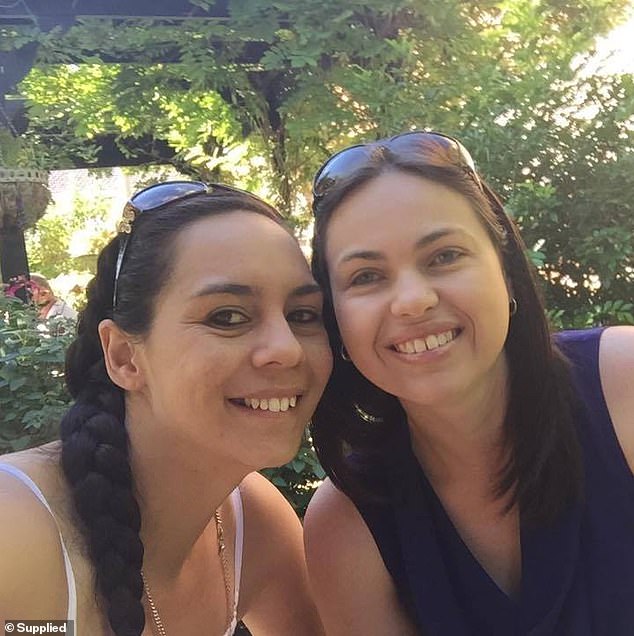Tarn Davies was due for a Pap test a few years ago when she finally got around to seeing her GP. The decision saved her life.
The 39-year-old mother of five from Tamworth, New South Wales, kept putting off the appointment due to her extremely busy schedule.
She told FEMAIL that she was healthy and had not had any worrying symptoms, so she did not think delaying the appointment would matter.
“I have five children and one of them was just a baby at the time,” she said.
“I was working full-time and didn’t have time to do health checks. I didn’t have any symptoms and I didn’t feel unwell, so I didn’t make it a priority.”
It wasn’t until her doctor called her in a panic a few days after her test that she realized she should have gone sooner.
Abnormal cells and three lesions had been detected on her cervix, and the growths were months away from turning cancerous.
Tarn’s doctor revealed that his condition was evolving rapidly and that he would need surgery immediately.
Tarn Davies (above with her husband) was 39 when she was diagnosed with HPV and told she was “pre-cancerous”.

The mother, left, had been putting off getting a Pap test for a few years, saying she was too busy taking care of her family to also feel a little uncomfortable making the appointment.
“My period was regular, I was healthy, everything was fine,” Tarn said. “There was no abnormal bleeding, no cramps, no pain, nothing.”
The test detected HPV-18 and high-risk abnormal cells.
HPV-18 is a common strain of human papillomavirus (HPV) that causes almost all cases of cervical cancer if left untreated.
Together with HPV-16, both strains are responsible for the majority of HPV-related cancers, accounting for the majority of cervical cancer cases.
Tarn said that before she had her Pap test, she had a deep-rooted “mom mentality” and would constantly put her children and partner before herself.
‘I was the one who booked doctor’s appointments, took my kids to the dentist, went to the shops.

When she finally got an appointment, the mother of five (above with her children) was told she had been on the verge of getting cancer.
‘I have a tendency to put myself last when it comes to my family.
“As a mother, if everyone else was okay, then I was okay.”
But the period of uncertainty after the abnormal result quickened Tarn’s heart rate.
“I was very anxious,” she said.
“The stress hit me hard. All I could think about was what would happen to my children if I had cancer. How would they grow up without me?”
The mother said she also felt “embarrassed” by the test itself, a feeling that contributed to her procrastination.
“I had a mental block when it came to having a Pap test. I’ve never had a bad experience and I’ve given birth five times, but I couldn’t bring myself to do it,” she said.
“But with Pap smears, you feel very embarrassed and shy. It’s kind of weird going in for it.”
The mother, now 43, recalls her hesitation with regret.

Now 43, Tarn, pictured with her father, reminds every woman she meets to get tested and put their own health first.
“It’s a couple of minutes of discomfort that can potentially save your life,” he said.
“My doctors reassured me when they told me the disease was limited to a small part of my body. It could have been much worse.”
Tarn shared that she underwent several biopsies and other tests before coming up with a solid treatment plan.
“I could have had a hysterectomy if it had turned out to be cancerous, but the colposcopy revealed that one of the lesions was CIN 3, which is the level before cervical cancer.”
Cervical intraepithelial neoplasia (CIN) are changes in the squamous cells that line the outside of the cervix.
There are three types: CIN1 (mild), CIN2 (moderate), and CIN3 (severe), which show how deeply the abnormal cells have penetrated into the skin covering the cervix.
In Tarn’s case, CIN 3 meant that the entire thickness of the lining of her cervix had abnormal cells.
“It’s scary to know how close I came to getting cancer,” the mother said.
She now advocates for regular screening and encourages her children, including her sons, to be vigilant.
“I’ve told them to make sure their wives and girlfriends put their health first,” he said.
“It’s important to raise awareness and ensure that the people you love are okay.”
Tarn is now free of HPV-18 and only needs to be tested every five years.
The Cancer Council revealed that 80 per cent of people are likely to have HPV at some point in their lives, often without any visible symptoms.
Two ways to prevent HPV from causing cancer are vaccination and early detection.
You should get regular screening tests even if you have been vaccinated, and the National Cervical Cancer Screening Program recommends that people with a cervix between the ages of 25 and 74 get a cervical cancer screening test every five years.


